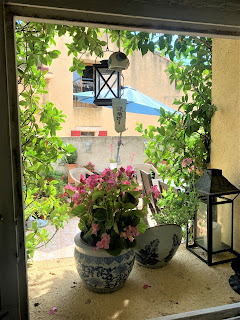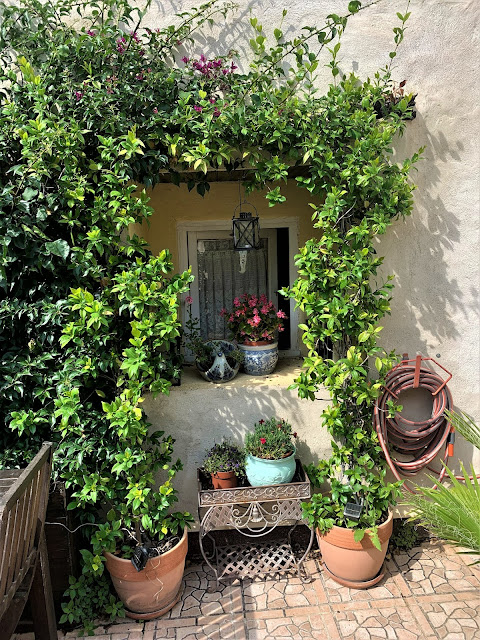Here, I'm going to discuss the primary reasons that we decided to establish residence outside the United States and why we continue to believe that the decision to do so was a correct one. But I'm warning you. American politics was not one of the reasons that we left, although the politics of such topics as health and healthcare did play a role. And yes, Bush the Younger was President at the time of our decision, so one could imagine fleeing his goofy act. But no, we chose as we did for personal reasons that trump elections. (Gives you pause, all of a sudden seeing that word, doesn't it? First and last time.)
TRAVEL IN EUROPE
What did we want to do when we retired? Travel. Where did we want to travel? Europe. Why not live there? Simple as that. Really. Simple as that.
We've been to the Roman baths in Bath, England. We've seen parmigiano reggiano cheese production in Parma, Italy. For our 50th anniversary, we saw Tosca performed at the Opera Bastille in Paris. We've shopped a couple of times a year in Spain, sampled the fascinating assortment of pintxos in San Sebastian, and visited the Guggenheim in Bilbao. We traced Cathey's family back into the 15th Century in an archive in Switzerland, a seven-hour car ride away. Seven hours on a train gets me to a friend's place in Germany. And did I mention that the clean sand, clean water beaches of the Mediterranean begin less than 25 miles away from where we live? Get the picture? Retired. Traveling in Europe.
Politics? I suppose that you can say so. We admit to being Eurocentric. We've studied Romance languages in school, visited museums displaying European cultural relics and art, listened to European music that's considered classical. At our age, we'd rather dig deeper into what was in our air growing up than try to inhabit a new cultural space. We have plenty to keep us busy right here in our old neighborhood.
WEATHER
Simultaneous with the decision to concentrate our search for a retirement destination in Europe, Cathey set one of her foot-down conditions, a primary condition. "I will never shovel snow again." If it's going to be Europe, that limits the geography. As I write this, Thanksgiving is just a few days away. As I write this, friends in Cologne, Germany are reporting snow. Cologne's latitude runs through Alaska. As I write this, friends in Paris report snow. A little early, but not unexpected. After all, North Dakota shares its latitude with Paris.
Researching for moderate climates, we centered our search on the Mediterranean Coast, not because we are beach people but because the sea moderates both summer and winter weather. There's lots of pretty country in that European strip of land up against the Med, and not all of it is super expensive. We found a nice pocket in the rural southwest of France, in Occitanie. Hot summers, but manageable with judicious use of the heat pump. Temps touch freezing a night or two in winter. The fireplace place makes it cozy. No snow shoveling.
COST OF LIVING
It may seem counter intuitive to some, but a couple with average Social Security Retirement checks can live quite comfortably in our neck of France. Of course, having additional pension income or regular income from an annuity or other investments makes life more comfortable. And having the equity in hand to purchase a suitable place to live is important. As an American, you can't just walk into a French bank and get a mortgage. But if you figure out your housing at a reasonable cost, the rest comes fairly easily.We eat foods that are in season and locally produced, not a hardship since growing seasons are long around the Med, including in nearby North Africa just a ferry ride away. And the food is grown for flavor. I don't know if we serve the best carrots that you've ever tasted, but we have had visitors who have said so. If you're an omnivore like me, in addition to veggies that taste like veggies, look for a village butcher who locally sources his meats. But beware the beef. Local beef is often grass fed and chewy, nearly game meat.
Electricity can be expensive, sufficiently so that heat pumps are ubiquitous and it's not uncommon to see private/communal solar panels/farms. Healthcare is among the best in the world and the French single-payer system is affordable and responsive. The French spend about half as much as Americans do per capita for health care, and they live longer. It's nice not feeling as though you are profit point in a health plan's spreadsheet.
When you add it all up including internet/phones (one-third of what I paid in the USofA before we left ten years ago) and taxes and water/sewer and gas/diesel and wine/spirits and restaurants and such, a pleasant and comfortable existence is easily doable with those two average Social Security checks that I mentioned.
YOUR EXPERIENCE MAY DIFFER
There are plenty of places in the world that provide even more affordable options for retirement living. If I read the current buzz correctly, Central and South America have replaced Mexico as the flavor of the month. And they probably are less expensive. But after research, expense became a secondary consideration for us. We knew that we could find a place that we could afford to buy where we wanted to live. And that's the point. We weren't running away from American politics. We were running towards a pleasant, adventurous retirement.
If you are going to live in Europe, best learn the language in the country of your choice and learn it well. While it's true that just about everyone in Europe understands some basic English, requiring them to speak your language in their country does not build community. And rural life in general is not for everyone. Not exactly a hotbed for Uber Eats. Rural folks in France are nice folks, don't get me wrong. but they are not American folks. Be prepared. Businesses close on odd days and at odd times for a variety of unexpected and unforeseen reasons. You have to learn the customs.
Renting for the long term before you buy is good advice, both in terms of France in general and your permanent landing spot in particular. We have a large house in the center of a very old town - small terrace, no garden, no garage, no pool. For each of those amenities, there's an extra few tens of thousands to pay. You have to decide what's important to you and what will be important to you ten years or more from now when the stairs are harder to climb and the garden threatens to get out of hand. All that I can do is repeat, we have not regretted our decision to move to France for one single minute.























